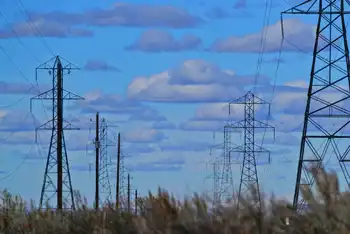Town fights plant
By Evansville Courier & Press
NFPA 70e Training - Arc Flash
Our customized live online or in‑person group training can be delivered to your staff at your location.

- Live Online
- 6 hours Instructor-led
- Group Training Available
The five-member council voted unanimously to oppose an air pollution permit for the Cash Creek power plant in Henderson County, Kentucky.
Looking out the town hall's picture window across the river into Kentucky, environmentalist John Blair noted the plant would be just south of the town, leaving the community almost directly in line to be affected by its pollution.
"As a teacher, I can't think of anything better to do for our children," said Councilwoman Anne Rust Aurand.
Town Council President William Kavanaugh said Newburgh will be represented "en masse" at the Kentucky Division of Air Quality's public hearing in Henderson.
"We will be moving forward in opposition to Cash Creek," he said.
After renewing its 2001 resolution initially opposing the plant, the council directed Town Manager Cynthia Burger to send the resolution as an official comment on the power plant's draft air pollution permit, to be signed by all council members. The council also agreed to formally request that Indiana Attorney General Steve Carter file a petition objecting to the Kentucky air pollution permit under Section 126 of the federal Clean Air Act.
"We are just 3,000 people, but maybe 3,000 people can have a voice," said At-large Councilwoman Shari Sherman.
Blair, president of Valley Watch, a local advocacy group for environmental health issues, credited Newburgh's 2001 resolution with helping force Cash Creek's developers, the Louisville, Ky.-based Erora Group, back to the drawing board to come up with a cleaner coal-burning power plant than it had originally proposed.
"I was really proud that you did that. Newburgh stepped up to the plate in a way that really hadn't been done here before," Blair said.
He said the town will not be alone. Earlier, Warrick County Commissioners took a similar vote to renew the county's 2005 opposition to the power plant. The commissioners also agreed to ask Indiana's attorney general to file a petition to stop the plant. Blair said he also has discussed the situation with Evansville Mayor Jonathan Weinzapfel.
The 770-megawatt power plant, as it is proposed, could still emit more than 700 tons per year of nitrogen oxide, which contributes to the formation of health-threatening ozone pollution, Blair said. Warrick and Vanderburgh counties have struggled to comply with federal air quality standards for ozone in the past decade, although the two counties currently comply.
Blair warned that the new plant, in such proximity to Vanderburgh and Warrick counties, could keep the region from meeting federal air-quality standards for both ozone and fine-particle pollution.
Cash Creek, according to the Kentucky Division of Air Quality's draft permit, would also emit up to 391 tons per year of sulfur dioxide, 965 of carbon dioxide, 32 of other air volatile organic chemical pollutants and a total of up to 415 tons per year of particulate pollution.











